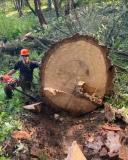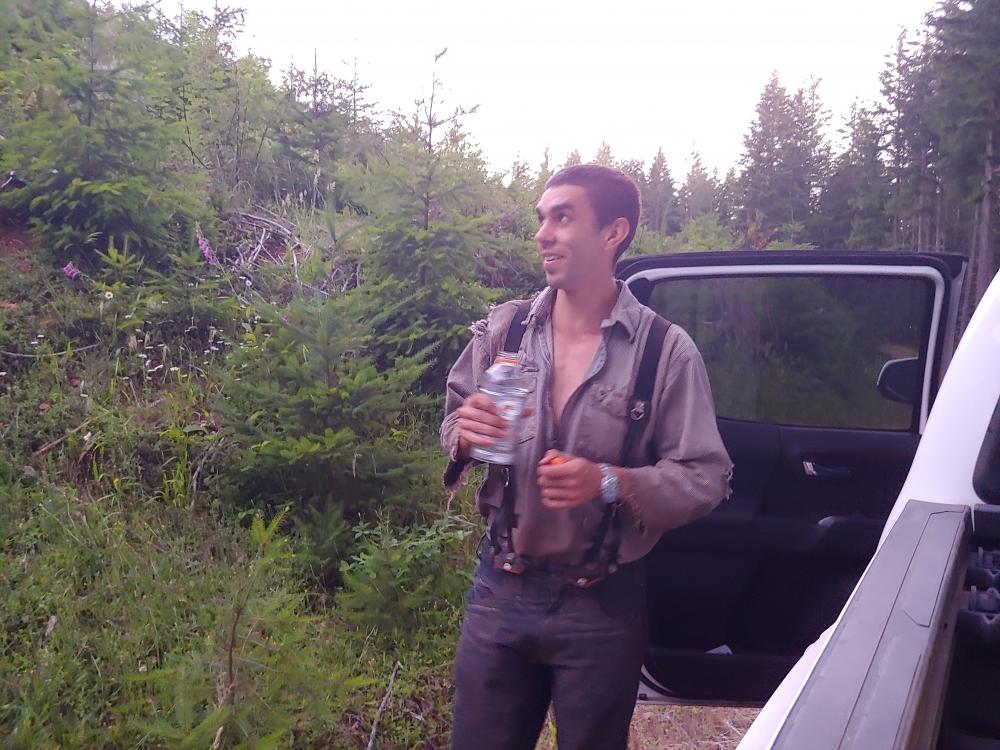Folders |
An Oregon Story: Matthew Maton's Journey From Racing, To The Forest, And Possibly BackPublished by
Former High School Sub-Four Miler and Oregon All-American Finds What He Needs To Feed His Soul In The Dangerous Work Of Logging By Doug Binder, DyeStat Editor COTTAGE GROVE, Ore. – The cutter sets the sharpened teeth of his chainsaw against the bark of a 100-foot tall Douglas fir and the roar echoes through the forest, drowning out the birds and sound of rushing water from a nearby stream. Sawdust spits from the other side of the tree until eventually, after less than a minute, the crown far above begins to tilt. The log falls gently, at first, away from the cutter and down the steep slope. It slams the ground with the violence of a high-speed car crash and slides, "in-lead," with the others at the bottom of the draw. Matthew Maton steps back from the tree he's just cut and carefully steps toward the next. For three and a half years, the former University of Oregon All-American, the sixth high school runner to break the sub-four mile barrier, has been up before light, into the forest by daybreak, to cut trees. It's dangerous, difficult work that requires the physicality of a finely tuned athlete and minute-by-minute attention to detail and safety. "Besides running, I don't think I've ever found anything that's harder," Maton said. "The first couple of years you have to learn to pace yourself to make it (through) all day. When I first started, I was going hard from the start and a couple of hours in, you get the shakes. It's steep ground and you hike with a power saw, gas and an axe all day. "You push your way through brush. It will wear you out pretty fast if you don't watch it." As the World Athletics Championships carry on day by day at Hayward Field this week, Maton will make it a couple of nights as a spectator. But when Eugene was awarded the meet back in late 2015, it was not far-fetched to believe that Maton might be on a starting line and wearing a USA uniform. Instead, after "medically retiring" from the sport and leaving the University of Oregon track and field team in the summer of 2018, soon after coaches Andy Powell and Maurica Powell left to take over the Washington program, Maton hit a low point, questioned his purpose, and receded from public view. He worked on a farm and that led to meeting a logger, who taught Maton the skills of the trade in one of Oregon's iconic industries: Timber. He learned to set chokers and operate machinery. And then he began to cut trees, a job with inherent risks and the possibility of death embedded into every six-hour work day. Last year, there was an accident. Maton got lucky. "We were cutting telephone poles," Maton said, describing a particular type of long, straight tree trunks that are perfect for hanging utility wires. "Everything was going great. (Another logger) was jacking them up the hill and everything was going great. I lopped off a log with a lot of tension in it and everything started rolling down. A big butt-log came down and landed on my leg and had me trapped for a little bit. "It was terrifying because I thought it was going to keep bouncing and land on my chest or something." Maton made it home with black-and-blue bruises from his feet to his waist. It was a Friday. He spent the weekend in bed and was back to work Monday. A day of logging typically pays around $500 per day. Good money. But much of it goes back into the investment of being a private contractor. Fuel costs. New chains. Other equipment. It all adds up. But for Maton, it's the work itself and the satisfaction of a productive day that keeps him going. "I've always enjoyed doing the kind of work that hurts," he said. Maton belongs on a short list of the greatest high school runners in Oregon history, along with Steve Prefontaine, Bill McChesney Jr., and Galen Rupp. He was a peer of Grant Fisher, beating the future Olympian and American record holder to a sub-four mile in the spring of 2015 when they were both high school seniors. (Fisher became the seventh prep athlete to achieve the feat, weeks after Maton did it). Maton was raised with his four siblings by his mother, a former barefoot NCAA cross country champion from South Africa, Michelle Dekkers. His father, Jim Maton, also an NCAA champion, indoors in the 800 meters, left the family abruptly when Matthew was a toddler. Maton grew up in Austin, Texas and moved with his family to Bend when he was 13. He was always attracted to the outdoors, to being independent, to working hard and keeping to himself. At Summit High, he became a sensation, and he pushed himself hard. But the sport didn't consume him. He preferred to spend his free time out in the wilderness, hunting, fishing, even trapping. He never enjoyed the attention. When a fellow student would mention that they saw him running before school somewhere, Maton made sure to get his run in even earlier this next day so that no one saw him.
The Possibility of a Comeback Maton's last race as an Oregon Duck was at the 2017 NCAA Division 1 Indoor Championships. He finished 12th, last, in the men's 3,000 meters. His first two years at Oregon contained some good races, and some not so good. He accumulated PRs of 3:58.34 in the mile and 7:52.51 in the 3,000 meters. In the summer of 2017, while holding down a 3 p.m. to 3 a.m. job at a Eugene bakery, he went for a run in the neighborhood south of Hayward Field and accidentally stepped in a hole, dislocating his ankle. Even before that, he was taking cortisone shots to help deal with plantar fasciitis. Those injuries eventually led to his departure from the team. After the Powells left, and a dispute with head coach Robert Johnson, Maton said he was pushed out. It wasn't an easy time. He remained quiet. And, perhaps symbolically, vanished into the Oregon forests, where he found a new way to work until he hurt every day. Maton has a University of Oregon degree in Environmental Science and yet, he cuts trees for a living. "It's definitely not good for the environment," Maton admitted. "But if I don't do it, someone else will." Logging is blue-collar work that employs rough men, sometimes on the fringes of society, many who engage in excessive drinking and drug abuse, Maton said. Few are college graduates. Although not as common as it once was, Oregon's logging industry continues to feed a limitless demand for wood and paper products. Maton has managed to come at this job clear-headed and reliable, and built a reputation with men who hire cutters as someone that can be trusted to do the work. Since January he has been working as part of a two-man team. They both wear whistles in case they are separated and one of them has an accident. "There definitely seems to be something different about cutters," Maton said. "They are funny, dry-humor kinds of guys who don't really care about anything else than getting their day in." No phones. No distractions. Do your best not to get killed. Unlike the rest of them, Maton still harbors a deep-seated desire to see what he might be able to achieve as a runner. Maton is still part of the fabric of TrackTown, USA, even if he he's hanging on by a thread. He hasn't raced at Hayward Field since the 2016 Olympic Trials. He just turned 26. Within the past couple of months, he's done a 10-miler with Cooper Teare. He's run with former teammate Mick Stanovsek, who might be rooming with him soon. He's in contact with Sam Prakel. And less than two weeks ago, Maton went to a local track and jumped in a workout with Nike pro and Olympian Ben Blankenship. He ran 400s and 1,000s, which he paid for the next day on the steep slopes of a hillside lugging his saw. There is a tantalyzing possibility that Maton might come back to the sport. His mother and his grandfather have both signaled their support in subtle ways. "He's obviously super-talented, and showed that in high school and did some good things in college," Blankenship said. "He can jump into training sessions. It just depends what he wants to achieve. For a guy like Matthew, talent doesn't change. It's just about fitness." Maton has been running three or four days a week for the past couple of years, mostly for the mental break from the stresses of logging. But packing a chainsaw through the brush year-round, his spiked cork boots clinging to steep hillsides, Maton has exhanged fitness for undeniable gains in strength. "Being in the injury cycle, and then removed for a while, he moves differently," Blankenship said. "He's become more of an all-around athlete. And logging has probably made him more effective in some aspects, stabilizing him in new ways and strengthened him." If Maton comes back, it will be on his own terms. "He's a super-tough kid. Super tough," Blankenship said. "Logging and running are not too different, at an elite level. You've got to get shit done." Maton is all about the work. The funding is a piece to figure out. He knows he can't cut trees and train full-time. It's too much. But he's open to the idea of another run, perhaps to the 2024 Olympic Trials. His outlook isn't complicated, much like his work day: put in the work and come home in one piece. "I want to work hard, have fun, and make some people, like my mom, happy," he said. |












